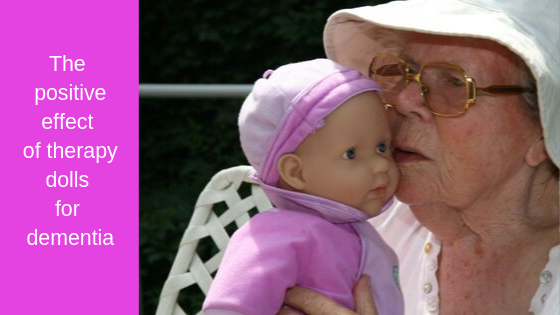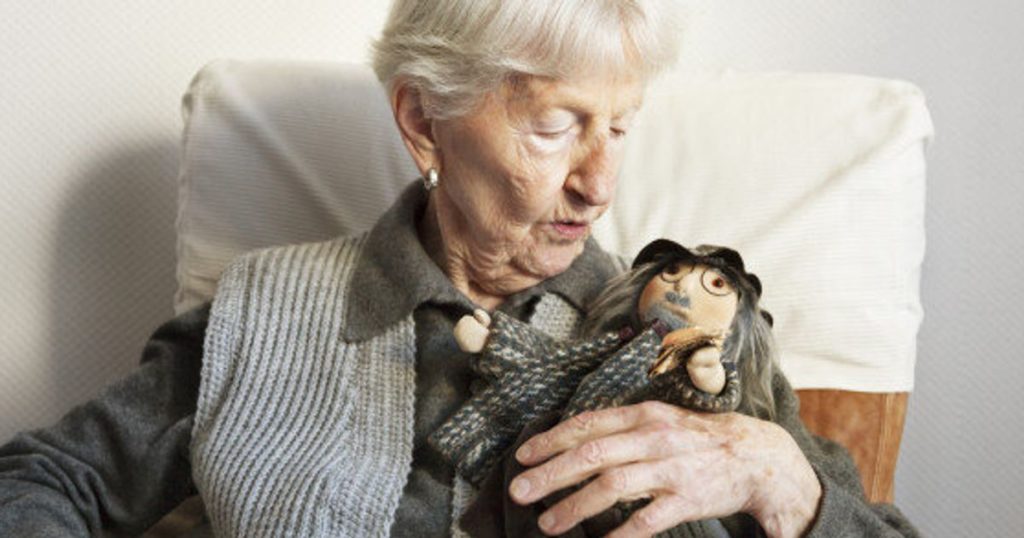
Doll therapy involves offering dolls to adults who are living with dementia and other medical conditions with the goal of improving their comfort, engagement, and quality of life. Doll therapy is typically used for people who are in the middle or late stages of dementia.
There are multiple companies the sell therapeutic dolls for people with dementia, as well as many caregivers who extol the virtues of a doll for adults
In Support of Therapeutic Dolls
Those in favor of offering dolls to people with Alzheimer’s and other types of dementia often cite benefits such as increased smiling and a decrease in challenging behaviors. They tell of situations where a loved one is dramatically calmed by holding a doll regularly, or interacts with the doll with such joy. Others also feel that it’s beneficial for someone with dementia to be able to serve as a caregiver for something since this might enhance her feelings of purpose.

Additionally, doll therapy is a non-pharmacologic way to address challenging emotions and behaviors that may develop in dementia. There are no medication side effects or drug interactions with doll therapy. Caregivers sometimes report that when a loved one is holding a doll, they are able to more easily provide care to their family member or resident because of the distraction and comfort the doll provides.
Baby dolls for Alzheimer’s patients are therapeutic
A helpful, non-drug way to calm and soothe agitated seniors with Alzheimer’s or dementia is to give them a soft, lifelike baby doll to cuddle.
These therapy dolls can even be effective in calming older adults with severe agitation or other significant behavioral challenges.
We explain why therapy dolls can work, share tips for introducing a doll to your older adult, address the potential controversy around the idea, and suggest inexpensive dolls that older adults may enjoy.
Why therapy dolls for dementia work
Therapy dolls can help seniors feel useful and needed and give them something positive to focus on.
Similar to the effect of soft toys like stuffed animals, hugging something soft helps someone with dementia feel comforted and soothed.
Another reason therapy dolls are helpful is that they can bring back happy memories of early parenthood for both women and men. Many older adults enjoy rocking and cuddling their doll. Some even adopt the baby as their own and make caring for it part of their daily routine.
Having a child to care for can also ease feelings of isolation and sadness. After all, when interacting with real babies, many people find their spirits lifted and their nerves calmed.

How to introduce doll therapy
The best approach is to casually introduce the doll to your older adult and let them decide if they like it or not.
If they have no interest in the doll or get upset, don’t make an issue out of it.
Even if someone isn’t interested in the moment, they may change their minds in the future so you could try again in a few weeks or months.
A few tips:
- Don’t act like the doll is a doll, refer to it as a baby and treat it like a real child.
- Get a lifelike doll, but one that doesn’t cry – that could be upsetting.
- Don’t force it, allow your senior to get to know the doll slowly.
Some caregivers find dolls controversial
We’ve heard from many caregivers that their older adults are calmer and happier now that they have their own baby doll. They’re relieved to have found a non-drug solution that eases their senior’s dementia symptoms.
But others are concerned that giving their older adult a doll would be demeaning or patronizing. But when someone has dementia, helping them feel safe and happy in their current reality is the top priority.
That’s why it can be necessary to be open to unconventional approaches like baby dolls, fidget blankets, and other simple activities and toys.
If they get upset or offended by the doll, you’ll know to cross that off the list of potential calming activities.
Of course, you know your older adult best. If you think a therapy doll might help them feel better and enjoy life more, why not give it a try? It’s an inexpensive “treatment” with no side effects. If it isn’t likely to suit their personality or preferences, move on to other ideas.
Leave a reply










Leave a reply